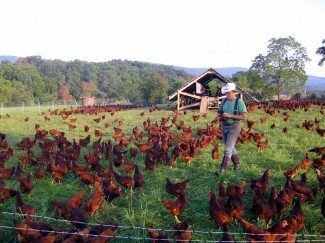Retail Relay changes name, opens online farmer's market
 Thanks to Relay Foods you can buy Joel Salatin's chickens online and pick them up just a few miles from home. FILE PHOTO BY DAVE MCNAIR
Thanks to Relay Foods you can buy Joel Salatin's chickens online and pick them up just a few miles from home. FILE PHOTO BY DAVE MCNAIR
Retail Relay, the local online grocery store that offers food items from producers and allows you to pick them up at various locations around town, recently changed its name to Relay Foods and opened up an online farmer’s market.
"'Retail' was kind of left over from a time before we narrowed our focus to creating an online food market," says Relay Foods marketing director Ted Corcoran about the name change. "We wanted to retain Relay. In fact, we refer to ourselves as "Relay" in everyday conversation."
As for the recently launched online farmer’s market, which features 20 different local farms and vendors offering produce, meat, cheese, and other locally produced goods, Corcoran says the response as been "incredible."
"For folks who, for all kinds of reasons, can't make it to the City Market on Saturday, this is a great way to support local enterprises and farms and enjoy local taste," says Corcoran. "For the vendors, they get another channel to sell their stuff 24/7."
"Relay expands our market," says John Whiteside, of Wolf Creek Farm in Madison. “We often hear our customers say that they would love to be able to purchase our grass-fed beef on weekdays or when they can’t make it to the City Market."
What’s more, Relay offers new vendors a chance to break into the market.
"Relay allowed us to put our baked goods on their site long before anyone in Charlottesville knew our name," says Shelia Talbott of Belle Haven Farm Bakery.
In addition to grass-fed beef from Wolf Creek Farm, Relay offers forest and pastured local pork from Babes in the Wood in Dillwyn and Meadow Green Farm in Sperryville. Both Susan Swales of Wild Oats Farm in Scottsville and the Miller family of Mount Vernon Farm in Sperryville provide Relay customers with local lamb raised on conservation farms that practice rotational grazing techniques. Relay's local chicken offerings include Joel Salatin's famous Polyface Farm broilers, Lovingston’s Davis Creek Farm poultry, and whole chickens from the Dayton cooperative, Shenandoah Valley Family Farms. The company has also recently developed relationships with the local Whole Foods and Horse & Buggy Produce.
Dish asked famous local food producing farmer Joel Salatin what he thought of the new online venture. While he's happy to see Relay Foods trying to do its part for local food, he says he'd like to see a "physical place with locally sourced stuff, but that's not a boutique kind of atmosphere."
Which got us thinking. Why does Relay have to have a website and drop off spots? If you wanted to distribute local food, couldn't you just open a local food store?
"I think the answer is yes," says Relay Foods CEO Zach Buckner. "But the answer overlooks an important point: Relay is built on the premise that people want to shop for food at places that are near where they work and live.”
As Buckner explains, they visited Good Foods Grocery a few months ago and saw that they had mapped the home addresses of all of their customers over a period of a month, literally with pins on a map. The pins formed a tight cloud around their store location.
"Plus, driving 18 minutes up 29 North to shop not only takes time and mental energy," says Buckner, "but it further congests our city with cars and traffic accidents and fumes."
As Buckner points out, you’d have to open at least a dozen local food stores in town to make buying convenient and environmentally responsible for customers.
"Relay allows vendors to have one central and dozens of virtual locations for customers," says Buckner, "which are shared among many vendors, are highly environmentally efficient, and don't cost a penny to operate."
But why can’t someone take the wildly successful supermarket business model and re-create it on a local level? When will buying local stop being a "movement," characterized by food boutiques, farmers' markets, and boosterism campaigns, and simply be an option for everyday shoppers?
But that, Corcoran insists, is exactly what Relay offers.
"Many of our customers always wanted to 'buy local' but really had no way to fit that kind of boosterism into their already busy lives," says Corcoran. "Relay allows vendors to reach those "every day shoppers."